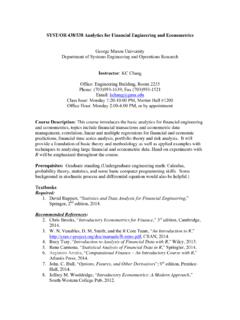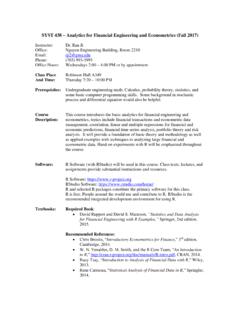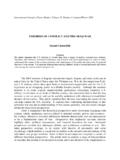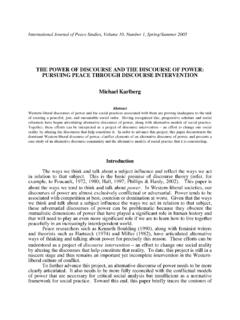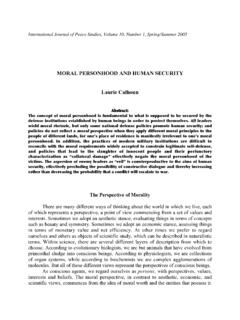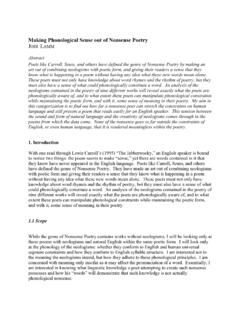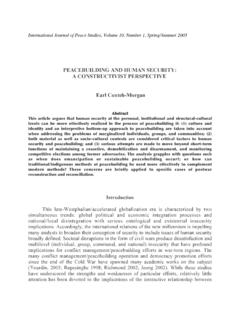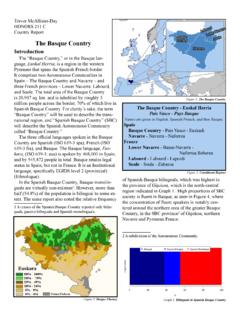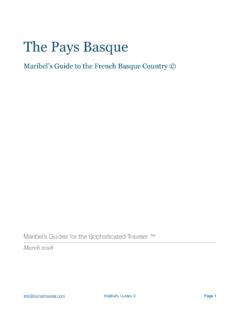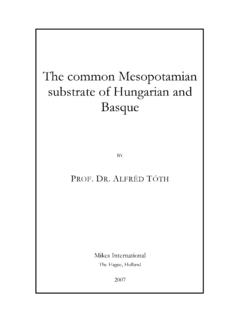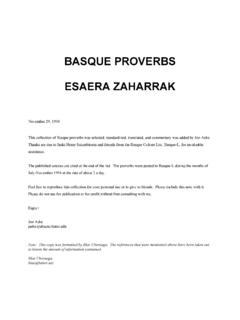Transcription of Introduction - George Mason University
1 International Journal of Peace Studies, Volume 19, Number 2, Winter 2014 The Role of Society in the Peace Process of the basque Country Ryszard Praszkier and Andrea Bartoli Abstract This article looks at a peacebuilding model used in basque country. Despite ongoing acts of terror and forced silence, basque society found peaceful solutions through cultural, social, and economic development. The following research, based on interviews and questionnaires, demonstrates a bottom-up approach to peace in the basque region. In this case, peace was unsustainable from a law-and-order perspective; legal action was not enough to maintain order. This study demonstrates the significance of social networks and the level of trust built into these networks. It concludes with a reflection on the unique nature of the basque journey towards p eace.
2 Introduction The basque Country s history is intriguing for many reasons. Firstly, it is one of the most dynamic regions of Europe, with a unique cultural landscape of burgeoning enterprises. Secondly, the Basques are the oldest European people who still speak Euskera. Interestingly enough, they have no clear familial relationship with any other tongue (Woodworth 2001, 2008). Thirdly, they have experienced a history of violence that has lasted decades. This violent past has impacted nearly all Basques on the Spanish side. The violence has come in many different forms: killing, kidnapping, and exile, most notably (Clark 1984; Loyer 1998; Hammer 2007). Yet, the violence suddenly stopped on October 20, 2011 when ETA announced the definitive cessation of its armed activity; a participant in our study spoke to this momentous event that would transform basque society forever.
3 A new political time is .. emerging in the basque country. We have an historical opportunity to find a just and democratic solution for the centuries old political conflict. Dialogue and agreement should outline the new cycle, over violence and repression. The recognition of the basque country and the respect for the will of the people should prevail over Without question, peacemaking is difficult, fragile, and complex and emerges in multiple forms (Bartoli 2012: 379). It doesn t happen overnight; it takes time and effort from many different actors. This beckons the following question: what factors led to peace and created order out of the complex system of violence in basque Country? Our hypothesis, verified in this research, is two-pronged: on the one hand, the basque nation was intentionally transforming the environment through cultural, social and economic development over the past decade.
4 As a result, the violence became increasingly foreign against the backdrop of a relatively stable, interconnected environment. On the other hand, the basque society, though seemingly reticent, 70 Ryszard Praszkier and Andrea Bartoli developed subtle ways of pressuring the terrorist groups to postpone violent methods. This study will tease out these mechanisms for peacemaking in the basque region. According to Spencer and Croucher (2008), a spiral of silence is an attitude of intimidation, fear, and self-censorship that prevents an open conversation about violence even after the abandonment of violence. We found this term to be quite relevant to the interviews and questionnaires with the basque people. The subjects outwardly expressed their gratefulness for this research.
5 Perhaps it gave them a space to be heard, and to not endure the oppression fashioned by the cycle of violence. But how does any society pursue peace-oriented goals in such a suppressed society? What was the mechanism of communication beyond spoken language? How did basque civil society find new ways to transform the narrow confines of conflict? The conjecture is that the recent basque economic prosperity acted as a shared asset and driving lever for non-verbal, peaceful communication, especially with families and close-knit circles. Then, weaker links were formed with people from outside these closely connected clusters, thus spreading and transforming an unspoken recognition of the predominant public opinion. That being said, violence and its termination were, and still are, a hidden agenda in the basque country.
6 This is to say that there are still no formal accounts of the peace process to date. One of the interviewees in our study expressed it this way: There is a lot of work to be done to bring o ut the truth, as people need to know the real story. Therefore I really thank you for your interest. In this context, you see the methodological challenge at the forefront of this unspoken truth : what strategy might circumvent the spiral of silence and produce undistorted data for those who fear the consequences of speaking openly? To confront this challenge, we decided on a two-step approach. First off, we began interviewing people from our social and academic networks and, by way of a snowball method, were recommended other people to interview. In this way, the first cohort was non-representative of the basque society.
7 The interviews served a deep purpose, however; they acted as a pilot and allowed for analysis and construction for the second stage, which came as a questionnaire aimed at a broader population. We wanted people to feel safe, as to avoid the spiral of silence, so we chose anonymity as the preferred method for attracting and gathering information. Thus, we would later place a survey on the Internet. This, again, imposed challenges and limitations, as most of the basque society did not have access to Internet; those that did had no way of knowing about our questionnaire. To resolve this natural dilemma, we focused on the possible-to-reach population. We also assembled data to help future studies aimed at a more representative sample of the society. Unique Culture, Economic Development As previously stated, the basque Country is indeed unique.
8 The ethnic background and the basque language (the Basques are the last surviving people from a line of European prehistory) suggests that they are a remnant of Paleolithic Europeans; the basque language, which descended from the Proto- basque , is the only Pre-Indo-European language having survived the sands of time (Hualde 1993; Zuazo 1996). Additionally, the history of its struggle for independence (Astrain & Stephens 1997; The Role of Society in the Peace Process 71 Llera 1999; Llera et al. 2007; Woodworth 2003) is dramatic. They have achieved rapid economic growth (Uranga 2002; Porter et al. 2004; Markuartu 2012) at the hands of a cooperative-based economic approach. In fact, in the basque Country, workers own and manage the world s largest successful cooperative Mondrag n2 (Whyte 1991; Herrera 2004; Hollender 2011).
9 Finally, we have seen an impressive streak of innovation as of late (Arancegui 2011; Espiau 2011; Alcalde 2012; OECD 2012). This has helped achieve relative stability in the basque environment. The above trends interrelate and reinforce each other, thus creating a unique basque character. Dr. Juan Jose Ibarretxe Markuartu argues that both the demand for legitimacy in politics and the creation of a competitive model based on solidarity have advanced basque self-government. However, the defense of basque identity, culture, and language is not solely related to a legitimate political fact, such as the claim for an identity in the current globalized world; it is also directly related to the achievement of sustainable human development. The drive for autonomy and independence has been part of basque imaginary for nearly two centuries.
10 It is known as fueros, meaning recognition of pre-existing rights. The Kings of Castile guaranteed basque autonomy ( a separate tax system and political status), which was later banned by the liberal government after the Third Carlist War in 1876. 4 It was at this time that the inspirational basque independence leader and writer, Sabino Arana, known as the father of basque nationalism, and the defender of the use of the basque language, founded the basque Nationalist Party (PNV). In the 20th century the Republican government of the early 30s had given the basque Country an autonomous status, which was subsequently denied by the Franco regime (1936-1975). This was a time of great cruelty. One such example is the aerial bombing of the basque city of Guernica in 1937, which led to hundreds of civilian deaths (Southworth 1977; Patterson, 2007)5.

